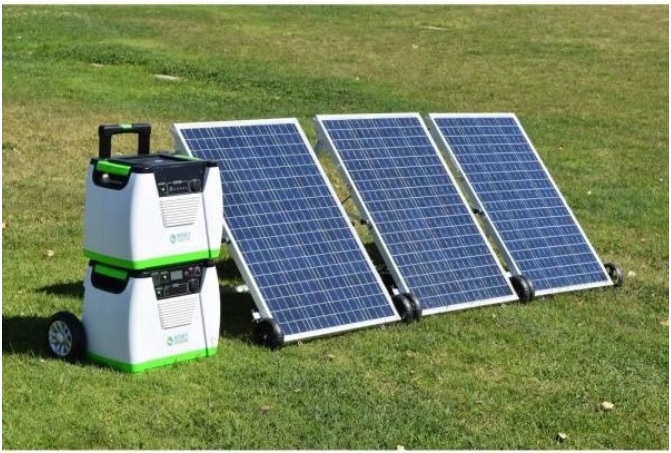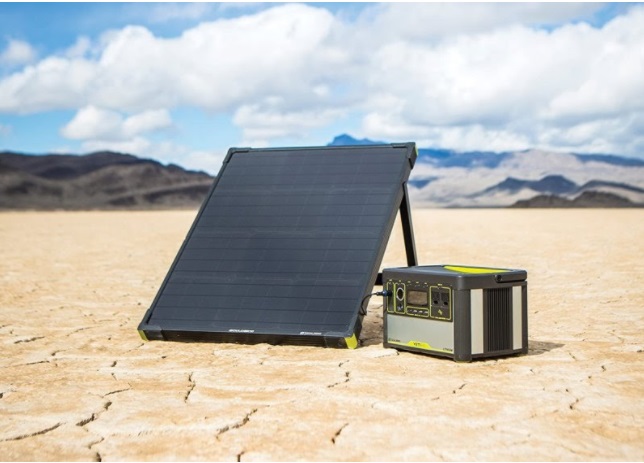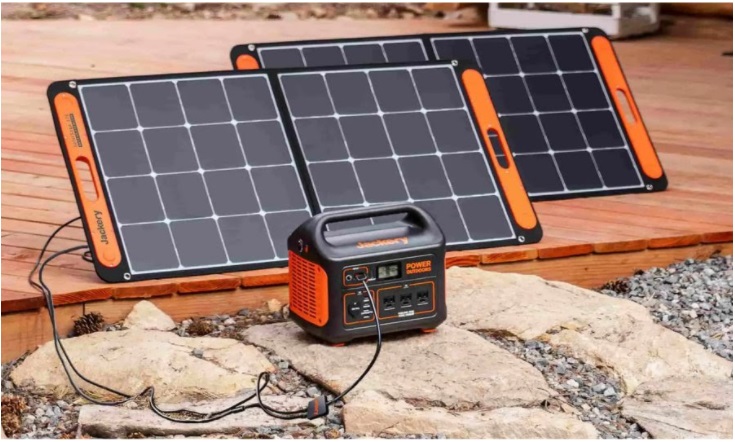The market of solar products is growing at a steady pace, and the growth is not only for rooftop units but also for portable Solar Generators. Solar generators are a great way to have some additional power to charge your electronics at the campsite.
They are clean and require very little maintenance. But how do they work, and what should you consider when buying a solar generator? In this post, along with that, we have also incorporated the working of the solar generator with its pros and cons.
What is a Solar Generator?

Unlike the generators, which run on conventional fuels and have moving parts, solar generators work on the energy of the sun and have no moving parts.
Solar generators can’t supply much power, and they are mainly used to charge electronics and run a few small appliances. They are also good to have as a backup when the electricity goes out for a few hours.
Here, the term solar generator refers to the portable solar setup, which consists of batteries, an inverter, a charge controller, and solar panels. They harness the energy from the sun, store it and then supply it back to the appliances.
How Does it Work?
As mentioned, the main components of a solar generator are the battery, solar panels, inverter, and charge controller.
The function of the solar panel is to capture the energy of the sunrays and flow it towards the battery where it gets stored. But before the electricity reaches the battery, the voltage level needs to be controlled, and a charge controller ensures that.
The solar generator can’t supply the power to appliances without storing it because the power generated from the solar panels will be very less, not enough to run any appliances. So batteries are used.
The batteries which are used to store the electricity are smaller to keep the generator portable, and almost all the solar generators use Li-ion batteries. If you want more energy storage, then many solar generators offer the flexibility to connect another battery to the existing one.
The electricity generated by the solar panels will be in the form of DC. It is also stored and supplied from the battery in the same form. But, most of the home appliances run on the AC. So to convert the DC electricity to AC, the inverter is employed.
After the inverter, there will be power outlets to attach the different appliances.
Different Parts of Solar Generators

To harness, store, and convert the DC electricity to AC electricity, the solar panels, batteries, and converters are used, respectively. All these parts, along with the charge controller, are designed to have the same electricity rating as the previous one supplying the power.
Most people use a solar generator at camping sites, so it should be portable. To make the solar generators more portable and manageable, the solar panels will be smaller compared to what is used for other purposes.
A battery used to store the power is the Lithium-ion battery; this is because they last longer and available at an economical price point. Other than that, the use of lead-acid batteries is also common.
A charge controller has the function of controlling the electrical current to the battery, it limits the current, so any damage to the battery can be avoided. The current tolerance of the battery will be on the label or in the user manual.
The voltage of the battery will be DC and will be lower, and an inverter used to convert the DC to AC also steps up the voltage to the required level. To 110 V or 240 V.
Advantages and Disadvantages of Solar Generators

Pros:
There are many advantages to solar generators, which we have discussed below.
- Unlimited Fuel
The solar generator works on the energy supplied from the sun, and that supply is unlimited. You get plentiful fuel, and that too free of cost. This means the operating cost for the solar generators will be next to nothing.
So, the fuel is not subjected to price fluctuation as gasoline and diesel do. It will always be available for free.
Solar energy is available everywhere. There is no need to find a station to get it; place the solar panels in the sunlight, and it will get charging.
- Clean Energy
Another benefit of a solar generator is that it supplies clean energy—no remains or fumes containing toxic pollutants. Solar generators are the best for the environment.
This means you won’t have to keep the generator away from your house or camping spot.
- Less maintenance
In fossil fuel generators, the burning of gasoline and diesel leaves behind the deposits, and it also contains the moving parts, so they require frequent maintenance.
But, for a solar generator, there are no moving parts and no deposits, so the maintenance need is very less.
- Quiet Operation
Solar generators don’t have moving parts and a roaring engine. The absence of those components reduces the noise of the solar generator to a negligible level.
This makes the solar generator a very good option to bring to the camping sites as you can have the power accompanied by the quietness of nature, contradictory to the conventional fuel generators.
Cons:
Solar generators also have some disadvantages. We have discussed them below.
- Initial cost
The operating cost of a solar generator is low but not the initial cost. The initial investment will be much higher compared to conventional generators.
- Whether Dependability
To properly work, a solar generator needs the sun exposure for a certain time. But sometimes, it may not be possible.
Even though the fuel is free from price fluctuations but it is not from the weather variations. On a cloudy day, there might not be enough sunlight available to charge the battery.
Also, in a monsoon, it is possible that you might not get electricity for more than a few days as the sky stays covered by the clouds.
- Recharging
The recharging takes place if the sun is out; when it is out, it will take almost a quarter of a day to charge the whole battery of a medium-size generator with the 100-watt solar panel. If the sun is not out someday, the battery won’t have energy, and the light goes, then the solar generator is of no use.
- Limited Power Supply
The power you can get from a solar generator is limited by the size of a battery it has. Most solar generators will have smaller batteries, and they are not enough to power the whole house.
Solar generators can be used to run smaller appliances to recharge your electronics. It is possible for them to supply more power, but as the power increases, the size of the battery increases. To charge the bigger battery, more solar panels will be required, which in turn increases the initial cost even more.
Conclusion
Solar generators are portable and provide just enough power to charge electronics or run small appliances for a short time. These are great companions if you are someone who is always on the go and wants some extra energy. They are easy to use and setup.
Also, you should consider its dependability on the weather and the small power capacity, and the time it will take to get recharged. So, if you think that it won’t be a big issue for you, then this environmentally friendly option is great.
Can you write an article on how an OLTC work in an Interconnecting autotransformer with tertiary delta winding
AMAZING CONTENT
Best Content